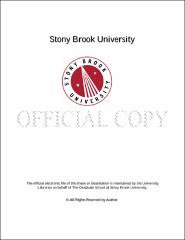| dc.identifier.uri | http://hdl.handle.net/11401/76605 | |
| dc.description.sponsorship | This work is sponsored by the Stony Brook University Graduate School in compliance with the requirements for completion of degree. | en_US |
| dc.format | Monograph | |
| dc.format.medium | Electronic Resource | en_US |
| dc.language.iso | en_US | |
| dc.publisher | The Graduate School, Stony Brook University: Stony Brook, NY. | |
| dc.type | Dissertation | |
| dcterms.abstract | Ours is a world unsettled by ecological catastrophe. From its scorched horizons, unsettled questions issue. Do we in our time have a sense for ecology? Nature? Have we truly understood its sense? This dissertation unearths the pre-theoretical simplicity, elemental ecstasy, and untold history of experience in search of answers – unthought by science yet copious to the senses. In it I develop a lived ontology of nature through the twofold ecological difference between: the sensible earth and world; the sentient flesh and body. Theoretically, this sense of ecology is an extension and enrichment of concepts sown by Martin Heidegger and Maurice Merleau-Ponty. Historically, I ground it on the Heraclitean experience of logos, the Homeric experience of oikos, and explore their convergence in the wisdom of Thracian women, foreigners, and slaves. Along the way that history is revitalized for the modern reader and expressively concretized by poetry, earthwork art, and a first-hand account of being lost in the wilderness, immersed in the waters, and at work on the trails of Yosemite. From these grounds I harvest an original interpretation of the Presocratic archeologies of the elements and a seminal renovation of eco-phenomenology for the twenty-first century. Against the classical reduction of nature to horizons immanent to subjectivity, presence, or ownness, I rethink its transcendence on the basis of our earthly finitude and ecological vocation as caretakers of earth. This allocentric incarnation of care releases a way of dwelling other-wise than the devastator, deferring projective disclosure to allow for affective exposure to the undisclosable otherness of wild being. These investigations culminate in the thought of the ecological fourfold. Reworked from the Heideggerian Geviert and the Merleau-Pontian chiasm, it limns how the four ekstases of the ecological difference gather into every experience of the things themselves. Existence emerges therein as the cross-fertilization of corporeal being-in-the-world and carnal being-of-the-earth. Finally, the folding of the fourfold adds to our understanding of time. A diagrammatic duplication of these temporal folds reveals how the inexplicable past and future of the earth are implicated in the timeliness of existence, furnishing the untimely, geohistorical grounds of being-there, in and toward the historical world. | |
| dcterms.abstract | Ours is a world unsettled by ecological catastrophe. From its scorched horizons, unsettled questions issue. Do we in our time have a sense for ecology? Nature? Have we truly understood its sense? This dissertation unearths the pre-theoretical simplicity, elemental ecstasy, and untold history of experience in search of answers – unthought by science yet copious to the senses. In it I develop a lived ontology of nature through the twofold ecological difference between: the sensible earth and world; the sentient flesh and body. Theoretically, this sense of ecology is an extension and enrichment of concepts sown by Martin Heidegger and Maurice Merleau-Ponty. Historically, I ground it on the Heraclitean experience of logos, the Homeric experience of oikos, and explore their convergence in the wisdom of Thracian women, foreigners, and slaves. Along the way that history is revitalized for the modern reader and expressively concretized by poetry, earthwork art, and a first-hand account of being lost in the wilderness, immersed in the waters, and at work on the trails of Yosemite. From these grounds I harvest an original interpretation of the Presocratic archeologies of the elements and a seminal renovation of eco-phenomenology for the twenty-first century. Against the classical reduction of nature to horizons immanent to subjectivity, presence, or ownness, I rethink its transcendence on the basis of our earthly finitude and ecological vocation as caretakers of earth. This allocentric incarnation of care releases a way of dwelling other-wise than the devastator, deferring projective disclosure to allow for affective exposure to the undisclosable otherness of wild being. These investigations culminate in the thought of the ecological fourfold. Reworked from the Heideggerian Geviert and the Merleau-Pontian chiasm, it limns how the four ekstases of the ecological difference gather into every experience of the things themselves. Existence emerges therein as the cross-fertilization of corporeal being-in-the-world and carnal being-of-the-earth. Finally, the folding of the fourfold adds to our understanding of time. A diagrammatic duplication of these temporal folds reveals how the inexplicable past and future of the earth are implicated in the timeliness of existence, furnishing the untimely, geohistorical grounds of being-there, in and toward the historical world. | |
| dcterms.available | 2017-09-20T16:50:47Z | |
| dcterms.contributor | O'Byrne, Anne | en_US |
| dcterms.contributor | Casey, Edward S | en_US |
| dcterms.contributor | Craig, Megan | en_US |
| dcterms.contributor | Davis, Bret W. | en_US |
| dcterms.creator | Mattingly, Wesley Nolan | |
| dcterms.dateAccepted | 2017-09-20T16:50:47Z | |
| dcterms.dateSubmitted | 2017-09-20T16:50:47Z | |
| dcterms.description | Department of Philosophy | en_US |
| dcterms.extent | 627 pg. | en_US |
| dcterms.format | Monograph | |
| dcterms.format | Application/PDF | en_US |
| dcterms.identifier | http://hdl.handle.net/11401/76605 | |
| dcterms.issued | 2017-05-01 | |
| dcterms.language | en_US | |
| dcterms.provenance | Made available in DSpace on 2017-09-20T16:50:47Z (GMT). No. of bitstreams: 1
Mattingly_grad.sunysb_0771E_13310.pdf: 6128154 bytes, checksum: 676fa26f17c6bf19dfdff88f6e9526ee (MD5)
Previous issue date: 1 | en |
| dcterms.publisher | The Graduate School, Stony Brook University: Stony Brook, NY. | |
| dcterms.subject | Philosophy | |
| dcterms.subject | earth, ecology, environmental philosophy, Heidegger, Merleau-Ponty, phenomenology | |
| dcterms.title | The Ecology of Being | |
| dcterms.type | Dissertation | |

